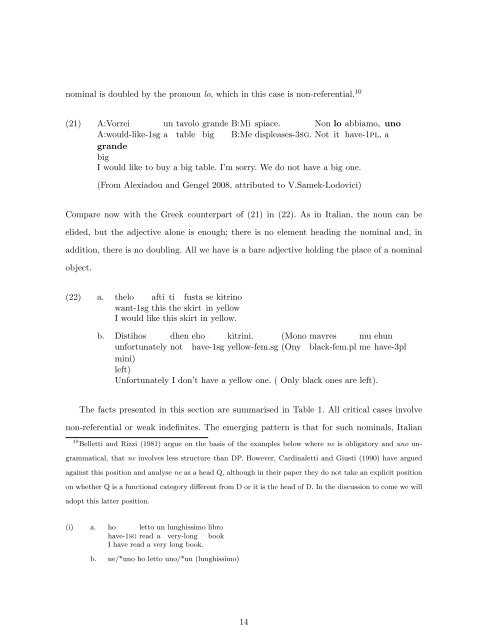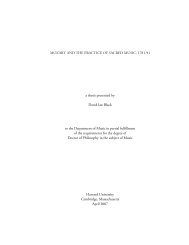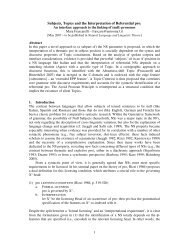draft of November 2011
draft of November 2011
draft of November 2011
You also want an ePaper? Increase the reach of your titles
YUMPU automatically turns print PDFs into web optimized ePapers that Google loves.
nominal is doubled by the pronoun lo, which in this case is non-referential. 10<br />
(21) A:Vorrei un tavolo grande B:Mi spiace. Non lo abbiamo, uno<br />
A:would-like-1sg a<br />
grande<br />
big<br />
table big B:Me displeases-3sg. Not it have-1pl, a<br />
I would like to buy a big table. I’m sorry. We do not have a big one.<br />
(From Alexiadou and Gengel 2008, attributed to V.Samek-Lodovici)<br />
Compare now with the Greek counterpart <strong>of</strong> (21) in (22). As in Italian, the noun can be<br />
elided, but the adjective alone is enough; there is no element heading the nominal and, in<br />
addition, there is no doubling. All we have is a bare adjective holding the place <strong>of</strong> a nominal<br />
object.<br />
(22) a. thelo afti ti fusta se kitrino<br />
want-1sg this the skirt in yellow<br />
I would like this skirt in yellow.<br />
b. Distihos dhen eho kitrini. (Mono mavres mu ehun<br />
unfortunately not<br />
mini)<br />
left)<br />
have-1sg yellow-fem.sg (Ony black-fem.pl me have-3pl<br />
Unfortunately I don’t have a yellow one. ( Only black ones are left).<br />
The facts presented in this section are summarised in Table 1. All critical cases involve<br />
non-referential or weak indefinites. The emerging pattern is that for such nominals, Italian<br />
10 Belletti and Rizzi (1981) argue on the basis <strong>of</strong> the examples below where ne is obligatory and uno un-<br />
grammatical, that ne involves less structure than DP. However, Cardinaletti and Giusti (1990) have argued<br />
against this position and analyse ne as a head Q, although in their paper they do not take an explicit position<br />
on whether Q is a functional category different from D or it is the head <strong>of</strong> D. In the discussion to come we will<br />
adopt this latter position.<br />
(i) a. ho letto un lunghissimo libro<br />
have-1sg read a very-long book<br />
I have read a very long book.<br />
b. ne/*uno ho letto uno/*un (lunghissimo)<br />
14
















